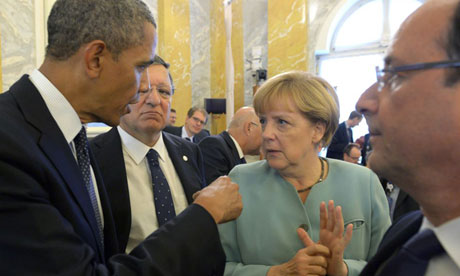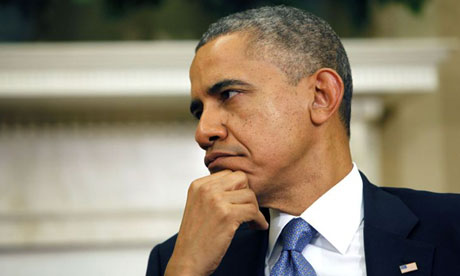International anger over US government surveillance has combined with a backlash against its current Middle East policy to leave President Obama increasingly isolated from many of his key foreign allies, according to diplomats in Washington.
The furious call that German chancellor Angela Merkel made to the White House on Wednesday to ask if her phone had been tapped was the latest in a string of diplomatic rebukes by allies including France, Brazil and Mexico, all of which have distanced themselves from the US following revelations of spying by the National Security Agency.
But the collapse in trust of the US among its European and South American partners has been matched by an equally rapid deterioration in its relationships with key allies in the Middle East.
Saudi Arabia this week joined Israel, Jordan and United Arab Emirates in signalling a shift in its relations with the US over its unhappiness at a perceived policy of rapprochement toward Iran and Syria.
Though the issues are largely unrelated, they have led to a flurry of diplomatic activity from Washington, which is anxious to avoid a more permanent rift in the network of alliances that has been central to its foreign policy since the second world war.
Secretary of state John Kerry has been meeting with Saudi and Israeli leaders in an effort to keep them involved in Middle East peace talks about Palestine and Syria, Obama met Wednesday with Pakistani prime minister Nawaz Sharif to reassure him over separate anxiety over US drone attacks, and the White House has been privately trying to mend fences with world leaders on the surveillance issue.
"The [NSA] revelations have clearly caused tension in our relationships with some countries and we are dealing with that through diplomatic channels," said White House spokesman Jay Carney on Thursday.
"These are very important relations both economically and for our security, and we will work to maintain the closest possible ties."
But the Guardian has spoken with several diplomats and foreign government officials – all of whom agreed to talk only on the condition of anonymity – who say the White House is still underestimating the anger felt over recent disclosures.
They argue that US officials are being deliberately disingenuous when they claim that all countries engage in similar forms of espionage, even against allies. While it is widely accepted that the US, Britain, France, Russia and China engage in counter-espionage, other countries do not have the tools to conduct surveillance on the scale of the NSA.
 Obama, Merkel and Hollande at the G20 summit in St Petersburg. Photograph: Getty
Obama, Merkel and Hollande at the G20 summit in St Petersburg. Photograph: Getty
A European diplomat said that the White House had presented a false comparison by claiming all countries were engaged in the same tactics.
"How would the US respond if it discovered a friendly country was covertly listening to the calls of thousands of US citizens – including Obama?" the diplomat said.
France, Mexico, Brazil and Germany have all provided the White House with a list of detailed questions about the reports of surveillance, demanding explanations and assurances it will stop. None have so far received what they believe to be a satisfactory answer.


